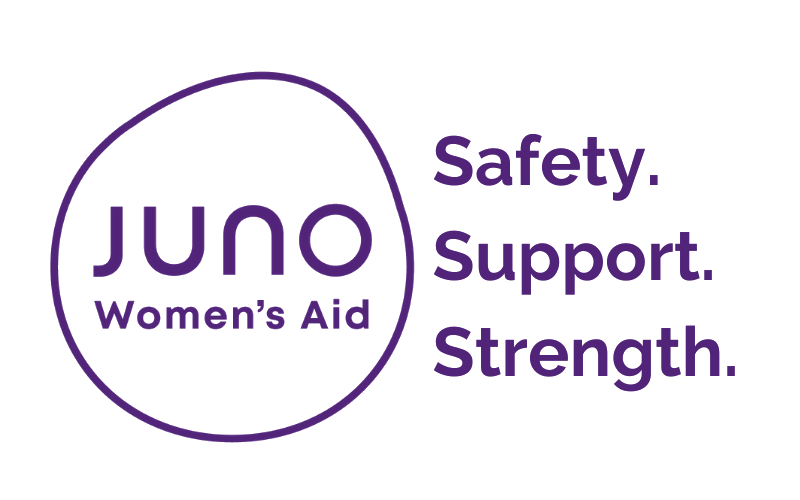If a friend confides in you about experiencing domestic abuse, your support could be really valuable. But you may feel worried about the right thing to do or say. That’s understandable. We aren’t taught these things and such a delicate situation may make you feel nervous or unprepared.
That’s why we’ve put together a few helpful pointers. Knowing how to respond to this situation can help you feel more confident. It could also help your friend feel heard and supported. It may even help empower her to take the next steps.
Please remember though: it is not within your power and it is not your responsibility to ‘fix’ the situation. Domestic abuse is complicated and multi-dimensional. And that’s why it’s good to get help from the experts, like us here at Juno.
Here are some guidelines you can follow. Don’t put any pressure on yourself, or your friend, to do anything. Just gently support her and let her know that Juno exists. And if you need to talk yourself, you’re welcome to call our helpline too. Our friendly team of women are here to support anyone affected by domestic abuse, which could include you as a concerned friend or relative.
Here’s how you can help.
Listen Without Judgement
The most important thing you can do is listen. Let your friend share her story at her own pace without interrupting or offering solutions. Avoid asking “why” questions, as they can come across as blaming or dismissive. Instead, nod to show you understand, and keep the focus on her.

If you are usually tactile with each other, you could perhaps offer a gentle touch on the arm or hold her hand. But the main goal is to simply let her tell you what she needs to. Let her go at her own pace. This could be the most difficult conversation she has had. But it’s really valuable that she is confiding in you. It could be the start of the situation changing.
Believe Her
Survivors of abuse often fear they won’t be believed. Reassure your friend that you trust what she’s telling you and validate her feelings. Statements like “I’m so sorry this is happening to you” can go a long way.

Other useful statements could be:
“I don’t have the answers but I will help you find a way forward.”
“You can get through this and to a happier place.”
“You deserve to live without abuse. Let’s get some help to make that happen, if you want to.”
“Thank you for trusting me. Do you have any ideas of what you would you like to happen moving forward?”

Offer Practical Support
Ask how you can help. This might involve accompanying your friend to appointments, helping her create a safety plan, or providing a safe place to stay temporarily.
You can read about safety plans here and what to pack in an emergency bag here. And you can call the Juno helpline and we’ll help you through any and every aspect of this.
Ensure you respect your friend’s decisions and don’t pressure her into actions she’s not ready for. This may be hard, because you want her and any children or pets to be safe, so call our helpline if you’re feeling overwhelmed or unsure. Your well-being and mental health is important, so try to confide in professionals who will keep your call confidential.
Know the Resources
If you’re in the Nottingham City or County area, please call us here at Juno. If you’re elsewhere in the UK, familiarise yourself with local domestic abuse services so you can guide your friend to professional help. See below for details of national help which can be a great starting point.
Protect Their Privacy
Abusers often monitor their victim’s communications. Be discreet and avoid leaving traces of your conversations. Use secure channels to communicate and never share information without her consent.
Remember, you can’t fix the situation, but your support can make a difference. Encourage your friend to prioritise her safety and remind her that she is not alone.
Final Thoughts
It is tough to know that someone you care about is experiencing domestic abuse. The advice here should point you in the right direction. Domestic abuse is a complex and difficult subject though, so it is best to involve professionals, like Juno, who can help your friend, her children and her pets, to safety.
Juno Help
Calls to our helpline are free from landlines and mobile phones within the UK and do not appear on itemised bills.
Our friendly team of women understand your situation because many of them have seen a friend or family member experience domestic violence. And many of them are survivors who have found freedom. Every call is confidential so please consider giving us a ring or suggesting your friend does. There is a better way to live with freedom and peace.

Helpline: 0808 800 0340
Sometimes our helpline is busy and you might not get through the first time, so please try again. We will always call you back if you leave a message stating it is safe to do so and if you leave us a safe contact number in your message.
If you are hearing impaired, text “Relay/NGT” to 18001 0808 800 0340. This option is available 24-hours a day, 365 days a year.
You can also email us on [email protected] 9 am – 9 pm.
Please note, we may not be able to respond to emails straight away, but will try to reply within 24 hours.
National Help
If you’re further afield, you could contact other charities like Women’s Aid, who have instant messaging and email contact on their website: https://www.womensaid.org.uk/
The National Domestic Abuse Helpline (0808 2000 247) also provide confidential support. They can help you make a safety plan, find safe housing, and access legal protections.
The deaf health charity Signhealth also runs a domestic abuse support service, DeafHope, using British Sign Language (BSL).

